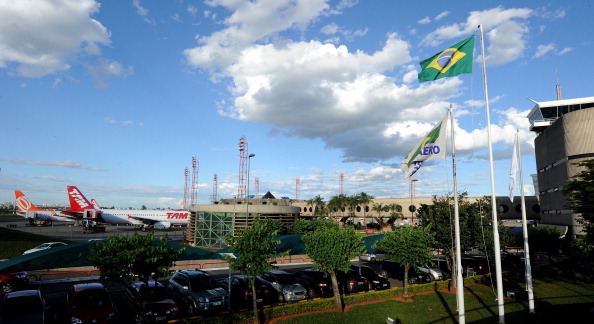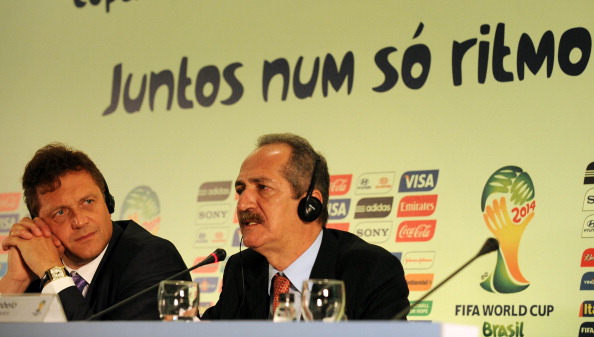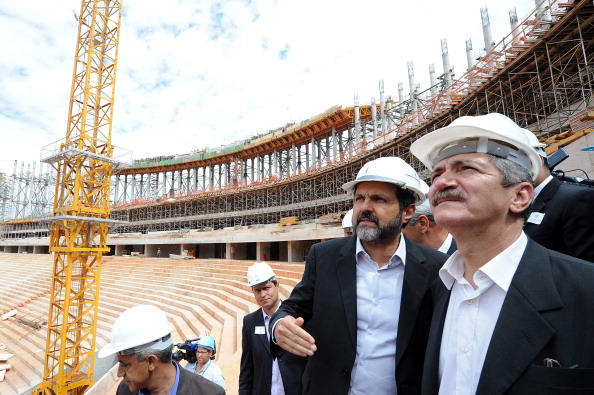By David Gold
June 8 – Aldo Rebelo, Brazil’s Sports Minister, has told insideworldfootball that the infrastructure development and construction projects taking place for the hosting of the 2014 FIFA World Cup are “going well”, despite suffering a raft of bad press and setbacks in recent months.
According to the Government all work is set to be completed by 2013, but to date, the South American country’s preparations have been held up by delays, including the naming of the host cities.
The construction of new arenas has also been a point of contention, particularly concerning the newly built Itaquera stadium in São Paulo – set to stage the opening game of the World Cup – as work only began a year ago.
“The priority now is to complete the construction of stadiums and modernisation of roads and transportation systems in World Cup host cities,” Rebelo (pictured above, far right) told insideworldfootball.
“The work on these projects is going well and there is no doubt that Brazil will host a great World Cup.”
The long distances some teams may have to travel between matches has also provided much concern ahead of the World Cup in two years’ time.
One team drawn in Group H of Brazil 2014 has fixtures in the relatively closely situated Belo Horizonte, São Paulo and Rio de Janeiro – meaning a total distance to travel of some 700 kilometres.

Likewise, one team drawn in Group G will play in Fortaleza, Recife and Salvador in the North East.
By comparison, hosts Brazil have to travel 4,000 kilometres due to the desire to have them playing in front of as many different sets of fans as possible.
But one of their group stage opponents has an even tougher task, facing trips from São Paulo in the South to Manaus in the North West, before finishing in Recife in the North East of the country.
There are currently significant efforts underway to upgrade Brazil’s air infrastructure ahead of the tournament, and Rebelo insisted that this would not be a problem.
“The upgrades would ensure that teams travelling longer distances will have comfortable and timely flights,” he explained.
Above all, the relationship Brazil has enjoyed with FIFA recently has sparked considerable controversy.

This was highlighted when FIFA general secretary Jérôme Valcke (pictured above, left) said that Brazil needed “a kick up the backside” due to the slow nature of their progress.
That led to a falling out with Brazil, but Rebelo says that this is now “a resolved issue”.
“The Brazilian Government’s relations with FIFA are based on cooperation in an effort to have the best organised World Cup of all time,” he added.
The relationship also seems to have improved since the departure of former Brazilian football chief Ricardo Teixeira.
The one time son-in-law of former FIFA President João Havelange was head of Brazil 2014 and was in charge of the Brazilian Football Confederation (CBF) for 23 years.
He quit in March after his relationship with both the Brazilian Government and FIFA turned sour, and has been replaced at both the CBF and Brazil 2014 by José Maria Marin.
Contact the writer of this story at zib.l1745272219labto1745272219ofdlr1745272219owedi1745272219sni@d1745272219log.d1745272219ivad1745272219
Related stories
June 2012: Brazilian President gives controversial World Cup law final sign-off
May 2012: FIFA’s Jérôme Valcke makes first trip to Brazil since “Bagshot blunder”
May 2012: Brazil Senate approves contentious 2014 World Cup law
May 2012: Brazil 2014 and FIFA agree a truce
May 2012: Brazil 2014 and Government officials to hold breakthrough talks with FIFA President

